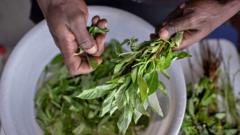Attiéké’s popularity transcends boundaries, connecting families and flavors across cultures and continents.
A Culinary Celebration: Attiéké, Ivory Coast’s Unesco-Recognized Delight

A Culinary Celebration: Attiéké, Ivory Coast’s Unesco-Recognized Delight
Ivory Coast's cherished dish attiéké earns a place in the UN cultural heritage registry alongside global cuisines, spotlighting why this fermented cassava staple is adored far and wide.
Attiéké, the quintessential dish of Ivory Coast, has recently received recognition from UNESCO, earning its place among the world’s cultural treasures, a status it shares with global delights like Japanese sake and Caribbean cassava bread. As BBC Africa correspondent Mayeni Jones, who spent her formative years in Ivory Coast, shares her affection for attiéké, it becomes clear that this West African dish is more than mere food – it embodies culture, nostalgia, and community.
The sound of vendors declaring "Attiéké chaud!" has resonated through Abidjan's streets for decades, encapsulating a vibrant culinary tradition that is still alive and thriving. Today, women continue to sell this beloved dish, now UNESCO-recognized, in various forms throughout the country. From bustling eateries to fancy restaurants, attiéké is a star on every menu, beloved not only in Côte d'Ivoire but also in neighboring countries like Ghana and Sierra Leone, where it boasts unique variations.
The distinct flavor profile of attiéké comes from its foundational ingredient, fermented cassava, which lends it a tangy, fluffy texture akin to couscous. Ivorian chef Rōze Traore emphasizes its versatility, which complements a wide range of spicy or savory sauces. Chef Paule-Odile Béké, a MasterChef: The Professionals contestant, describes attiéké as "sour, zingy, and sweet," an accurate representation of its complex character.
Traditionally reserved for special occasions, attiéké’s status has evolved, now enjoyed daily by many Ivorians. Its adaptability means it pairs beautifully with various dishes, particularly grilled meats and seafood, often served with a refreshing salsa atop.
Mayeni Jones reflects on her deep-rooted connection to attiéké; it represents a bridge to her childhood, marked by the joyful gatherings around shared meals. It is a comfort food that invokes memories of family and festivities, even as she navigated challenges amid civil unrest that forced her to leave her homeland.
She recalls one of her first dishes made for her husband, which sparked dreams of opening a restaurant centered around attiéké. Today, the dish symbolizes unity, an experience best shared among friends and family, eating with hands and savoring every taste.
While attiéké's journey to UNESCO listing may introduce it to a broader audience, its significance to the Ivorian populace remains deeper than culinary pride. It embodies resilience, culture, and a sense of belonging for expatriates and locals alike. As the world becomes aware of attiéké, perhaps it will inspire a greater appreciation for the rich, diverse culinary heritage of West Africa that continues to thrive and evolve.






















